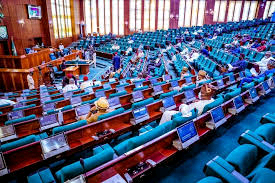A Heated Exchange in the Senate
The Nigerian Senate witnessed a dramatic showdown on Thursday as Senate President Godswill Akpabio and Senator Seriake Dickson engaged in a heated argument over the handling of the debate on the state of emergency in Rivers State. The clash, which unfolded during plenary, highlighted the deep divisions within the Senate over the federal government’s controversial decision to declare a state of emergency in the oil-rich state.
The Spark: A Motion to Reorder the Agenda
The tension began when Senate Leader Michael Bamidele Opeyemi moved a motion to reorder the day’s agenda, prioritizing the debate on the Rivers State emergency over other legislative matters. As Bamidele stood to explain the procedural steps, Senator Seriake Dickson, representing Bayelsa Central and a former governor of Bayelsa State, raised a point of order, seeking to address what he believed was a breach of Senate rules.
Dickson’s intervention immediately drew the ire of Senate President Akpabio, who was hesitant to grant him the floor. The exchange quickly escalated into a war of words, with both senators trading sharp remarks and refusing to back down.

Akpabio’s Retort: A Witty but Tense Exchange
In a moment that captured the tension in the chamber, Akpabio reminded Dickson of his earlier public statements opposing the Senate’s stance on the Rivers State emergency. “Senator Seriake Dickson, let’s not argue. If we argue, it won’t be good for any of us,” Akpabio said, attempting to defuse the situation with a mix of humor and firmness.
He continued, “We are all distinguished people. You were a former governor; I was a former governor. Please turn off your mic and sit down. I watched you on television. You said, ‘Whatever the Senate does, the Senate will never go with you.’ I don’t know, but if you have already made up your mind to go on television when the Senate has not done anything or considered any issue, I am not arguing with you, but I say, please allow me to preside.”
Dickson’s Response: A Call for Mutual Respect
Unwilling to yield, Dickson fired back, emphasizing the need for mutual respect among senators. “Mr. Senate President, you know we must have mutual respect for all our colleagues, and I do have regard for you, particularly as our presiding officer, and I think that should be reciprocal,” he said.
Dickson explained that his point of order was intended to draw attention to Senate rules, which he believed required the chamber to first break into a closed-door session before debating sensitive matters like the state of emergency. His argument resonated with several senators, prompting Senate Leader Bamidele to propose a motion for a closed-door session. The motion was swiftly seconded by Minority Leader Abba Moro, and the Senate proceeded to a private meeting.
The Bigger Picture: A Divided Senate
The clash between Akpabio and Dickson underscores the deep divisions within the Senate over the Rivers State emergency. While some lawmakers support the federal government’s decision as a necessary step to restore order, others view it as an overreach of executive power and a threat to democratic principles. The heated exchange also reflects the broader political tensions in Nigeria, where regional and partisan loyalties often collide in high-stakes debates.
The closed-door session that followed the argument provided an opportunity for senators to discuss the issue away from the public eye. However, the underlying tensions are unlikely to dissipate anytime soon, as the Rivers State emergency continues to polarize opinions within and outside the Senate.
Implications for Governance: A Test of Leadership
The confrontation between Akpabio and Dickson is a test of leadership for both the Senate and the federal government. As the upper chamber of Nigeria’s National Assembly, the Senate plays a critical role in shaping the country’s response to crises. The outcome of the Rivers State emergency debate will have far-reaching implications for governance, federal-state relations, and the rule of law.
For Akpabio, the challenge is to maintain order and unity within the Senate while navigating the complex political dynamics at play. For Dickson and other critics of the emergency declaration, the task is to uphold democratic principles and ensure that the federal government’s actions are held to account.
A Senate in Crisis
The heated argument between Akpabio and Dickson is a microcosm of the broader crisis facing Nigeria’s political landscape. As the Senate grapples with the Rivers State emergency, the stakes could not be higher. The outcome of this debate will not only determine the fate of Rivers State but also set a precedent for how Nigeria addresses future political crises.
For now, the Senate remains a house divided, with lawmakers on both sides of the aisle struggling to find common ground. As the closed-door session continues, Nigerians will be watching closely to see whether their leaders can rise above partisan divides and prioritize the nation’s interests.